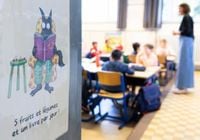The City of Brussels has embarked on a significant initiative to enhance the quality of language education in its primary schools by introducing a language premium of €155.43 for teachers who speak and teach French. This move, as pointed out by Anaïs Maes, the City councillor for Dutch-speaking education, aims to address the pressing teacher shortages in metropolitan areas where language and cultural challenges are prevalent.
"With this bonus, we not only want to increase the attractiveness of the teaching profession, but also convince more people to follow teacher training and choose teaching," Maes stated, underlining the dual purpose of the financial incentive. Beyond just attracting new teachers, this bonus recognizes the commitment of existing educators working in challenging environments.
Brussels is a bilingual city where French is often the first language spoken socially among many pupils. By strengthening the teaching of French, the city hopes to offer a more comprehensive language education that reflects the community's linguistic realities. This initiative is seen as vital in fostering quality bilingualism, which is increasingly recognized as a valuable asset in the context of Brussels' international character.
A notable event coinciding with this educational initiative is scheduled for March 20 and 21, 2025, when several Dutch-speaking schools, like Hoofdstedelijke Basisschool De Zennestraal and Hoofdstedelijk Atheneum Karel Buls, will collaborate on cultural and sports projects with their French-speaking neighboring schools, including Ecole Fondamentale Baron Steens and Athenée Les Pagodes. This collaboration not only promotes linguistic proficiency but also builds community ties across the bilingual divide.
Meanwhile, in the Netherlands, education minister Eppo Bruins has announced plans for a flexible language policy targeting higher education institutions within 25 kilometers of the border. This proposal includes institutions such as Maastricht and Hasselt universities, which often cater to students in both Dutch and English. However, while the government has indicated support, it has not yet guaranteed any immediate changes to current policies.
The minister's strategy seems aimed at addressing concerns regarding student populations in border regions. For those institutions that struggle to survive with limited domestic recruits, especially in areas facing depopulation, there is an underlying worry that restrictions on foreign language programs could exacerbate enrollment challenges. Bruins emphasized that these border institutions need to demonstrate their connection to their local labor markets to qualify for special treatment regarding language instruction.
Despite Bruins' assurances, the outlines of these policy shifts remain vague. For now, educational institutions will have to justify their English-taught programs, which might leave many at risk of discontinuation if they do not meet newly defined criteria.
Specific universities, such as Radboud University, which has an international student percentage of about ten percent, are already navigating these waters. The government’s proposed cap on foreign students raises questions about sustaining vital programs, particularly in sectors like engineering, where labor shortages are acute and a command of Dutch is not always crucial.
The previous government had allocated €90 million from 2022 to 2027 to support higher education in regions that are notably facing demographic decline. However, depopulation is a challenge that only a few regions are grappling with, and policies that do not take broader regional concerns into account may miss the mark.
In light of these developments, both the Brussels initiative and the Dutch government's language policy underscore a significant shift in addressing educational needs. By enhancing language teaching in primary education and considering flexibility for higher education near borders, the initiatives reflect a growing recognition of the need for adaptation in educational strategies to meet the pressures of demographic challenges and ensure quality education.






